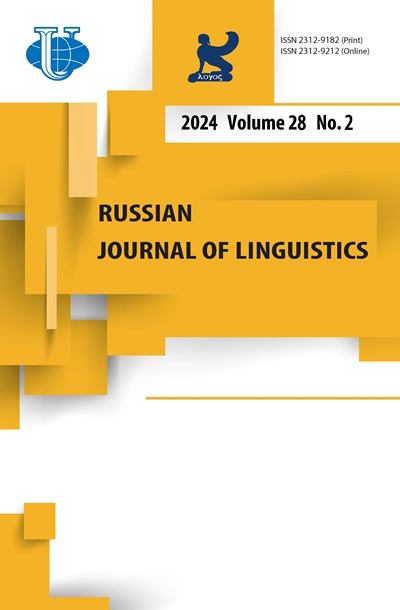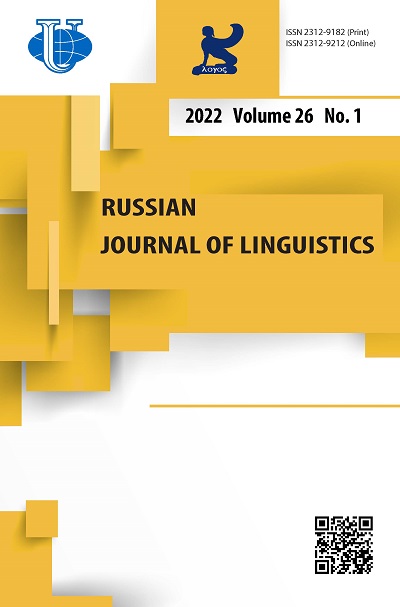Авторская позиция в текстах диссертаций
- Авторы: Фендри Э.1, Трики М.1
-
Учреждения:
- Сфакский университе
- Выпуск: Том 26, № 1 (2022)
- Страницы: 51-73
- Раздел: Статьи
- URL: https://journals.rudn.ru/linguistics/article/view/30640
- DOI: https://doi.org/10.22363/2687-0088-27620
Цитировать
Полный текст
Аннотация
Написание диссертации - это не только способ получить ученую степень в определенной области знания, но еще и возможность опубликовать свое исследование как внутри страны, так и за ее пределами. Другими словами, проведение исследования прежде всего требует, чтобы голос автора был услышан. Используя оценочную модель Дж. Мартина и П. Уайта (Martin & White 2005), мы рассматриваем, каким образом тунисские магистранты и докторанты, использующие английский язык как иностранный, устанавливают диалог с читателем, который выступает в создаваемых ими текстах как средство убеждения. Сопоставление проводится с целью обнаружить различия в проявлении голоса автора в текстах магистерских и докторских диссертаций. Проводится качественный и количественный анализ корпуса, включающего 20 разделов с анализом научной литературы и 20 разделов, содержащих обсуждение результатов, из 10 магистерских (MA) и 10 докторских (PhD) диссертаций в области прикладной лингвистики, написанных на английском языке тунисскими авторами. В корпусе идентифицируются языковые маркеры, выражающие позицию автора, и осуществляется их качественный анализ с использованием субсистемы установления контакта, чтобы охарактеризовать высказывание как диалогически контрактивное или экспансивное. Далее с помощью количественного анализа, использующего статистическую программу SPSS, сравнивается, как диалогичность проявляет себя в сопоставляемых разделах диссертаций магистрантов и докторантов. Результаты показывают, что выражение авторской позиции в обоих разделах более проблематично для магистрантов, чем для докторантов. Диалогическая контракция в субкорпусе магистерских диссертаций демонстрирует ограниченность авторской позиции в разделах «Обзор научной литературы» и неумение обозначить личный вклад в разделе «Обсуждение результатов». Тот факт, что докторанты часто прибегают к экспансивным высказываниям в обоих разделах, демонстрирует их научную зрелость. Критическая оценка трудов предшественников при анализе научной литературы и умение обозначить свое авторство отличают их от магистрантов. Результаты сопоставления не только выделяют сильные стороны, присущие докторантам, но и указывают на проблемы при установлении диалога с читателем в текстах диссертаций. Они могут быть использованы для рассмотрения продуктивности исследователей, использующих английский язык как иностранный в педагогическом контексте, с точки зрения стратегий выражения идентичности и позиции в различных разделах диссертаций.
Ключевые слова
Об авторах
Эмна Фендри
Сфакский университе
Автор, ответственный за переписку.
Email: emna3000@yahoo.fr
Ph.D. по английскому языку и лингвистике Route de l'aéroport- Km 4.5 - Sfax, Tunisia
Моунир Трики
Сфакский университе
Email: mtriki2001@yahoo.com
профессор английского отделения факультета гуманитарных наук Route de l'aéroport- Km 4.5 - Sfax, Tunisia
Список литературы
- Allison, Desmond et al. 1998. Dissertation writing in action: The development of a dissertation writing support program for ESL graduate research students. English for Specific Purposes 17 (2). 199-217. https://doi.org/10.1016/S0889-4906(97)00011-2
- Alotaibi, Hmoud S. 2019. An exploration of authorial stance in SSCI-ranked journals versus non-SSCI-ranked journals. 3L: Language, Linguistics, Literature 25 (3). 65-78. https://doi.org/10.17576/3L-2019-2503-05
- Alramadan, May M. 2020 Authorial stance in English, Arabic and EFL applied linguistics research: An appraisal study. Asiatic: IIUM Journal of English Language and Literature 14 (1). 189-216
- Aull, Laura L. & Zak Lancaster. 2014. Linguistic markers of stance in early and advanced academic writing: A corpus-based comparison. Written Communication 31 (2). 1-33. https://doi.org/10.1177/0741088314527055
- Barton, Ellen L. 1993. Evidentials, argumentation, and epistemological stance. College English, 55(7). 745-769. https://doi.org/10.2307/378428
- Bazerman, Charles. 2004. Intertextuality: How texts rely on other texts. In Charles Bazerman & Paul Prior (eds.), What writing does and how it does it?, 1-11. London: Lawrence Erlbaum.
- Bitchener, John & Helen Basturkmen. 2006. Perceptions of the difficulties of postgraduate L2 thesis students writing the discussion section. Journal of English for Academic Purposes 5. 4-18. https://doi.org/10.1016/j.jeap.2005.10.002
- Bizzell, Patricia. 1992. Academic Discourse and Critical Consciousness. Pittsburgh/London: University of Pittsburgh Press.
- Becher, Tony & Trowler, Paul R. 2001. Academic Tribes and Territories: Intellectual Enquiry and the Culture of Disciplines. 2nd edn. Philadelphia: SRHE and Open University Press.
- Can, Cem & Fatma Yuvayapan. 2018. Stance-taking through metadiscourse in doctoral dissertations. Online Submission 6 (1). 128-142.
- Casanave, Christine P. & Philip Hubbard.1992. The writing assignments and writing problems of doctoral students: Faculty perceptions, pedagogical issues, and needed research. English for Specific Purposes 11. 33-49
- Chafe, Wallace. 1986. Evidentiality in English conversation and academic writing. In Wallace Chafe & Johanna Nichols (eds.), Evidentiality: The linguistic coding of epistemology, 261-272. Norwood/New Jersey: Ablex Publishing Corporation
- Chafe, Wallace. L. & Johanna Nichols. 1986. Evidentiality: The Linguistic Coding of Epistemology. Norwood/New Jersey: Ablex Publishing Corporation.
- Chang, Peichin. 2015. EFL doctoral students’ conceptions of authorial stance in academic research writing: An exploratory study. RELC Journal 47 (2). 1-18.
- Charles, Maggie. 2006. The construction of stance in reporting Clauses: A cross-disciplinary study of theses. Applied Linguistics 27 (3). 492-518. https://doi.org/10.1093/applin/aml021
- Cherry, Roger D. 1988. Ethos versus persona: Self-representation in written discourse. Written Communication 5 (3). 251-276. https://doi.org/10.1177/0741088388005003001
- Connor, Ulla. 2008. Mapping multidimensional aspects of research: Reaching to intercultural rhetoric. In Ulla Connor, Ed Nagelhout & William W. Rozycki (eds.), Contrastive rhetoric: Reaching to intercultural rhetoric, 299-315. Amsterdam: John Benjamins Publishing
- Elghoul, Hana. 2016. Projection Strategies and the Expression of Stance in Academic Writing: A Functional Grammatical Approach to Literature Review Chapters in Linguistics and Literary Studies Master’s Theses. Unpublished MA dissertation. University of Sfax, Faculté des Lettres et des Sciences Humaines
- Ellinger, Andrea D. & Baiyin Yang. 2011. Creating a whole from the parts: Qualities of good writing. In Tonette S. Rocco & Timothy G. Hatcher (eds.), The handbook of scholarly writing and publishing, 115-124. San Francisco: Jossey-Bass
- Ewald, Helen R.1998. Waiting for answerability: Bakhtin and composition studies. In Frank Farmer (ed.), Landmark essays on Bakhtin, rhetoric and writing, 225-240. New Jersey: Hermagoras Press.
- Flowerdew, John. 2000. Discourse community, legitimate peripheral participation, and the nonnative-English-speaking scholar. TESOL Quarterly 34 (1). 127-150.
- Gillett, Andy, Angela Hammond & Mary Martala .2009. Successful Academic Writing. Canada: Pearson Longman.
- Gray, Bethany & Douglas Biber. 2012. Current conceptions of stance. In Ken Hyland & Carmen Sancho-Guinda (eds), Stance and voice in written academic genres, 15-33. Great Britain: Palgrave McMillan
- Gosling, Patricia & Bart Noordam .2011. Mastering your PhD: Survival and Success in the Doctoral Years and Beyond. 2nd edn. Verlag Berlin Heidelberg: Springer.
- Grossberg, Lawrence. 1982. Intersubjectivity and the conceptualization of communication. Human Studies 5 (3). 213-235.
- Hajji, Ayadi. 2012. Academic Literacy in the Electronic Era: Aspects of stability and Signs of change. Unpublished Ph.D dissertation. University of Carthage, Higher Institute of Languages Cité Elkhadhra, Tunis.
- Hyland, Ken. 1998. Boosting, hedging and the negotiation of academic knowledge. Text 18 (3). 1-33
- Hyland, Ken. 2003. Second Language Writing. New York: Cambridge University Press.
- Hyland, Ken. 2006. English for Academic Purposes: An Advanced Resource Book. London/New York: Routledge Taylor & Francis Group.
- Hyland, Ken. 2008. Writing theories and writing pedagogies. Indonesian Journal of English Language Teaching, 4 (2). 91-110.
- Hyland, Ken. 2019. Metadiscourse: Exploring Interaction in Writing. London/New York: Bloomsbury.
- Imel, Susan. 2011. Writing a Literature Review. In Tonette S. Rocco & Timothy G. Hatcher (eds.), The handbook of scholarly writing and publishing, 145-160. San Francisco: Jossey-Bass
- Intaraprawat, Puangpen & Margaret S. Steffensen.1995. The use of metadiscourse in good and poor ESL essays. Journal of Second Language Writing (4) 3. 253-272.
- Ivanič, Roz. 1998. Writing and Identity: the Discoursal Construction of Identity in Academic Writing. Amsterdam/ Philadelphia: John Benjamins Publishing Company.
- Johns, Ann M. & John M. Swales. 2002. Literacy and disciplinary practices: Opening and closing perspectives. Journal of English for Academic Purposes 1. 13-28.
- Kothari, Chakravanti R. 2004. Research Methodology: Methods & Techniques. New Delhi: New Age International Publishers.
- Lee, Monica. 2011. Finding Voice: Appreciating Audience. In Tonette S. Rocco & Timothy G. Hatcher (eds.), The handbook of scholarly writing and publishing, 102-114. San Francisco: Jossey-Bass.
- Lee, Alison & Claire Aitchison. 2011. Working with Tensions: Writing for Publication During Your Doctorate. In Tonette S. Rocco & Timothy G. Hatcher (eds.), The handbook of scholarly writing and publishing, 62-74. San Francisco: Jossey-Bass
- Martin, Jeannett R. & Peter P. R. White. 2005. The Language of Evaluation: Appraisal in English. Basingstoke [UK]: Palgrave Macmillan
- Mei, Wu S. & Desmond Allison. 2005. Evaluative expressions in analytical arguments: Aspects of appraisal in assigned English language essays. Journal of Applied Linguistics 2 (1). 105-127. Equinox Publishing. https://doi.org/10.1558/japl.2005.2.1.105
- Mohan, Bernard A. & Winnie A. Lo. 1985. Academic writing and Chinese students: Transfer and developmental factors. TESOL Quarterly, 19 (3). 515-534
- Myers, Greg. 2001. ‘In my opinion’: the place of personal views in undergraduate essays. In Martin Hewings (ed.), Academic writing in context: implications and applications, 63-78
- Lancaster, Zak. 2014. Exploring valued patterns of stance in upper-level student writing in the disciplines. Written Communication 31 (1). 27-57. https://doi.org/10.1177/0741088313515170
- Nackoney, Claire K., Sunny L. Munn & Jesus Fernandez. 2011. Learning to write: Wisdom from emerging scholars. In Tonette S. Rocco & Timothy G. Hatcher (eds.), The handbook of scholarly writing and publishing, 26-43. San Francisco: Jossey-Bass
- Ochs, Elinor. (ed.). 1989.The Pragmatics of Affect, [special issue]. Text 9 (3).
- Paltridge, Brian. 2002. Thesis and dissertation writing: An examination of published advice and actual practice. English for Specific Purposes 21. 125-143.
- Paltridge, Brian & Sue Starfield. 2007. Thesis and Dissertation Writing in a Second Language: A Handbook for Supervisors. London/ New York: Routledge Taylor & Francis Group.
- Paltridge, Brian., & Sue Starfield. 2020. Thesis and Dissertation Writing in a Second Language: A Handbook for Students and their Supervisors. 2nd edition. London/New York: Routledge Taylor & Francis Group
- Prior, Paul. 2001. Voices in text, mind, and society: Sociohistoric accounts of discourse acquisition and use. Journal of Second Language Writing 10 (1-2). 55-81
- Rouissi, Ikram. 2013. Attribution and Averral as Manifestations of Voice in Experts’ and Novices’ Secondary Research Papers in English Language Teaching. Unpublished Ph.D dissertation. University of Mannouba, Faculty of Letters, Arts, and Humanities
- Salager-Meyer, Françoise. 1994. Hedges and textual communicative function in medical English written discourse. English for Specific Purposes13 (2). 149-170
- Sancho-Guinda, Carmen & Ken Hyland. 2012. Introduction: A context-sensitive approach to stance and voice. In Ken Hyland & Carmen Sancho-Guinda (eds.), Stance and voice in written academic genres, 1-11. Great Britain: Palgrave McMillan
- Saz-Rubio, Ma M. 2011. A pragmatic approach to the macro-structure and metadiscoursal features of research article introductions in the field of Agricultural sciences. English for Specific Purposes 30 (4), 258-271
- Street, Brian. 2009. “Hidden” features of academic paper writing. Working Papers in Educational Linguistics 24 (1). 1-17.
- Swales, John. 1990. The concept of discourse community. In Douglas Downs & Elizabeth Wardle (eds.), Writing about writing, 466-473. Boston: Bedford St Martins.
- Swales, John M. & Christine B. Feak. 1994. Academic Writing for Graduate Students: Essential Tasks and Skills. A course for Nonnative Speakers of English. USA: The University of Michigan Press.
- Thompson, Paul. 2009. Literature reviews in applied PhD theses: Evidence and problems. In Ken Hyland & Giuliana Diani (eds.), Academic Evaluation, 50-67. London: Palgrave Macmillan.
- Triki, Mounir & Akila Sellami-Baklouti. 2002. Foundations for a Course on the Pragmatics of Discourse. Sfax: Imprimerie Reliure d’Art.
- Vygotsky, Lev S. & Michael Cole. 1978. Mind in society: The development of higher psychological processes. Cambridge/MA: Harvard University Press.
- Weigle, Sara C. 2002. Assessing Writing. Cambridge University Press.
- Woodward-Kron, Robyn. 1999. Learning the discourse of a discipline: the nature of the apprenticeship. HERDSA Annual International Conference, Melbourne, 12-15 July 1999.

















